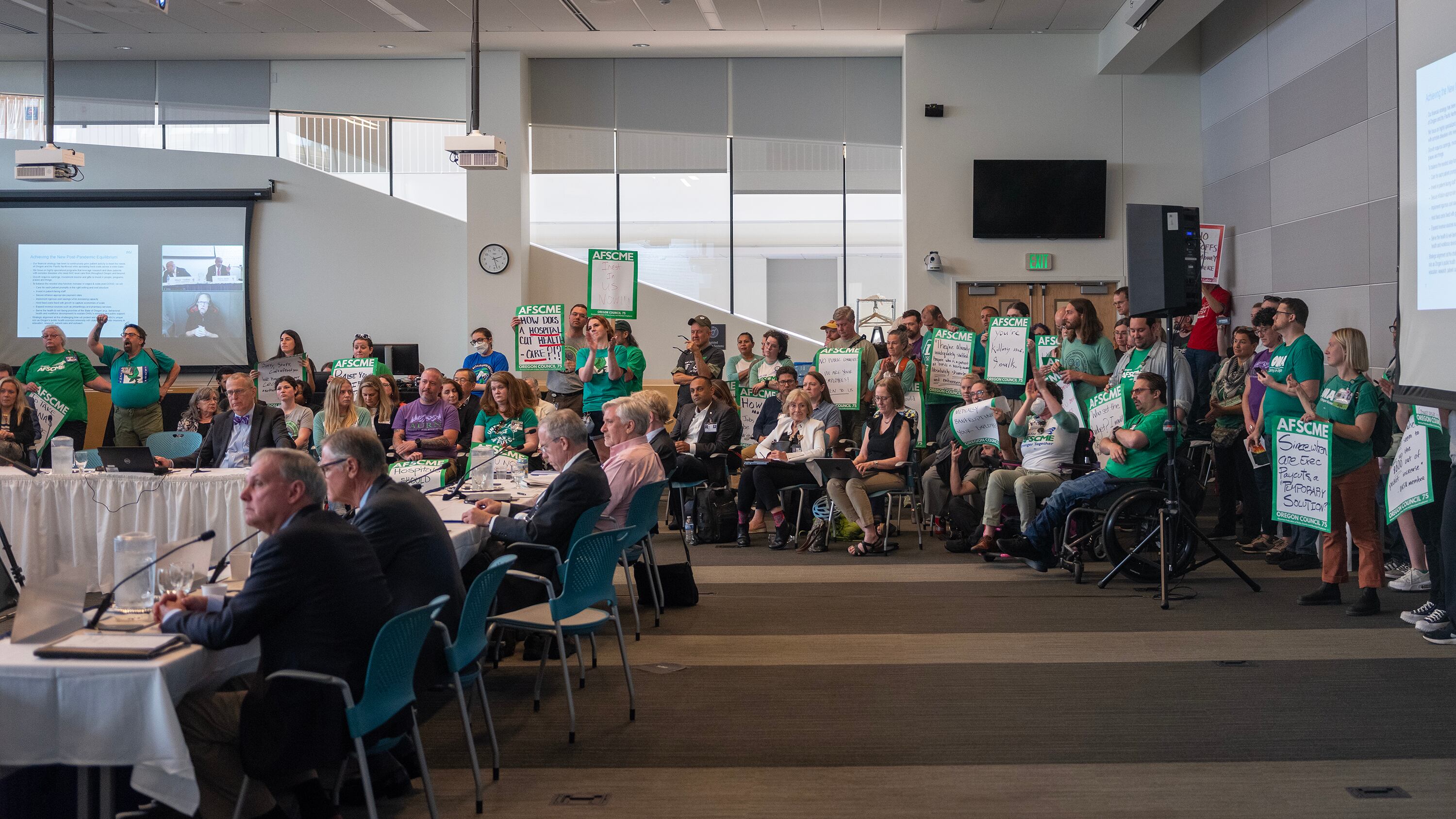OHSU NURSES GET THE AX: As part of wide-ranging job cuts, Oregon Health & Science University this week cut a telehealth nursing unit set up during the COVID-19 pandemic and featured on the OHSU Foundation website for its service to people across the state. The university started the Connected Care Center on March 30, 2020, just as the pandemic began. It was open only to OHSU patients before opening to the public shortly afterward. Nurses worked from home, taking calls about testing locations, quarantining, and care for the disease, according to a June 2021 write-up by OHSU. Since the pandemic, the 16 nurses in the unit had been supporting the university’s clinics and triaging patient calls, according to an employee who wished to remain anonymous. OHSU is in the midst of cutting some 500 positions, including nurses, as part of a “strategic alignment” despite repeated vows from management to spare most “patient-facing” employees. “Cutting nurses is confirmation that OHSU executives will not limit their layoffs to non-patient-facing positions,” says Duncan Zevetski, a registered nurse and vice president at the Oregon Nurses Association, which represents 4,500 OHSU employees. “Their cuts will reduce Oregonians’ access to care and ultimately make it harder for more people to get the care they need when they need it.” The university has cut a total of 22 nurses in recent days, the union says. The layoffs come as OHSU pursues a merger with Legacy Health, another hospital system that is struggling with high costs for salaries and supplies. “The strategic alignment work aims to shift OHSU’s overall strategy to its core, state-mandated missions, including improving access to the complex specialty and subspecialty services that no other health system in the region can provide,” university spokeswoman Sarah Hottman said in an email. “As a result, while planned reductions in force are largely administrative roles, other programs may be impacted as well.”
CITY MECHANICS TO MOVE TO SWAN ISLAND: After fixing vehicles for more than 50 years in the cramped, sloping and degrading Kerby Garage in North Portland, the city’s 40 mechanics who repair 2,300 of the city’s vehicles are finally getting a new home. On July 1, the city signed a 20-year lease for a sprawling facility on Swan Island owned by beverage distribution tycoon Ed Maletis. The Kerby Garage’s operations will move in to that space in 2026. Over the next two years, the new garage will get $54 million worth of improvements and infrastructure to be able to handle the mechanics’ daily operations; the cost will be repaid over a 20-year loan period by city bureaus whose vehicles are repaired and serviced by the Kerby mechanics. WW wrote about Kerby Garage and the mechanics who work there in an April cover story (“The Garage That Portland Forgot,” April 10). “We are thrilled that the entire City Council came together to recognize the importance of the city’s core work and to invest in and support one of the key groups that provides it,” says Maty Sauter, manager of the city’s Bureau of Fleet and Facilities.
ETHICS COMMISSION WON’T INVESTIGATE KOTEK: The Oregon Government Ethics Commission has dismissed ethics complaints against Gov. Tina Kotek about the role first lady Aimee Kotek Wilson has played in her administration. After a spirited discussion June 28 whether the agency’s preliminary investigation was sufficient, a motion to move forward with a formal investigation resulted in a 4–4 deadlock, largely along partisan lines. Under commission rules, the motion needed five votes to pass and, therefore, failed. The panel’s action follows the receipt of numerous ethics complaints about Kotek Wilson’s work in the governor’s office. A number of commissioners, including Dan Mason and Richard Burke, questioned OGEC director Susan Myers about the thoroughness of her investigation—asking specifically why she hadn’t interviewed the three former staffers whose departures from Kotek’s office triggered the complaints. Myers acknowledged she had not interviewed any of the departed staff. She explained that nothing she saw in emails or media reports suggested to her there was a reasonable basis for such inquiries because nothing she saw represented a potential ethics violation. The governor’s office expressed satisfaction with the outcome and released 11,000 pages of public records July 1 showing communications between Kotek Wilson and the governor’s staff. Few showed matters of substance being discussed.
METRO VENUE CHIEF RETIRES: On June 28, Robyn Williams, executive director of Metro’s Portland’5 Centers for the Arts, announced her retirement effective July 1. Williams oversaw the five performing arts centers, which comprise the Keller Auditorium, the Arlene Schnitzer Concert Hall and the three theaters tucked into Antoinette Hatfield Hall. In an email to the Metro Exposition Recreation Commission, Williams wrote: “Portland’5 has a number of challenges facing it in the coming year and I do not feel I’m the right person to be leading the organization. Combined with a number of personal reasons and family health issues now is the best time for my retirement.” The city of Portland owns the performing arts centers, but Metro manages the buildings and the performances hosted by the five venues, including Broadway shows at the Keller. Williams’ retirement comes as the future of the Keller is in limbo; three groups are currently pitching competing proposals for the renovation of the auditorium or a new location for it. The tug of war over the Keller’s future has at times turned acrimonious.
